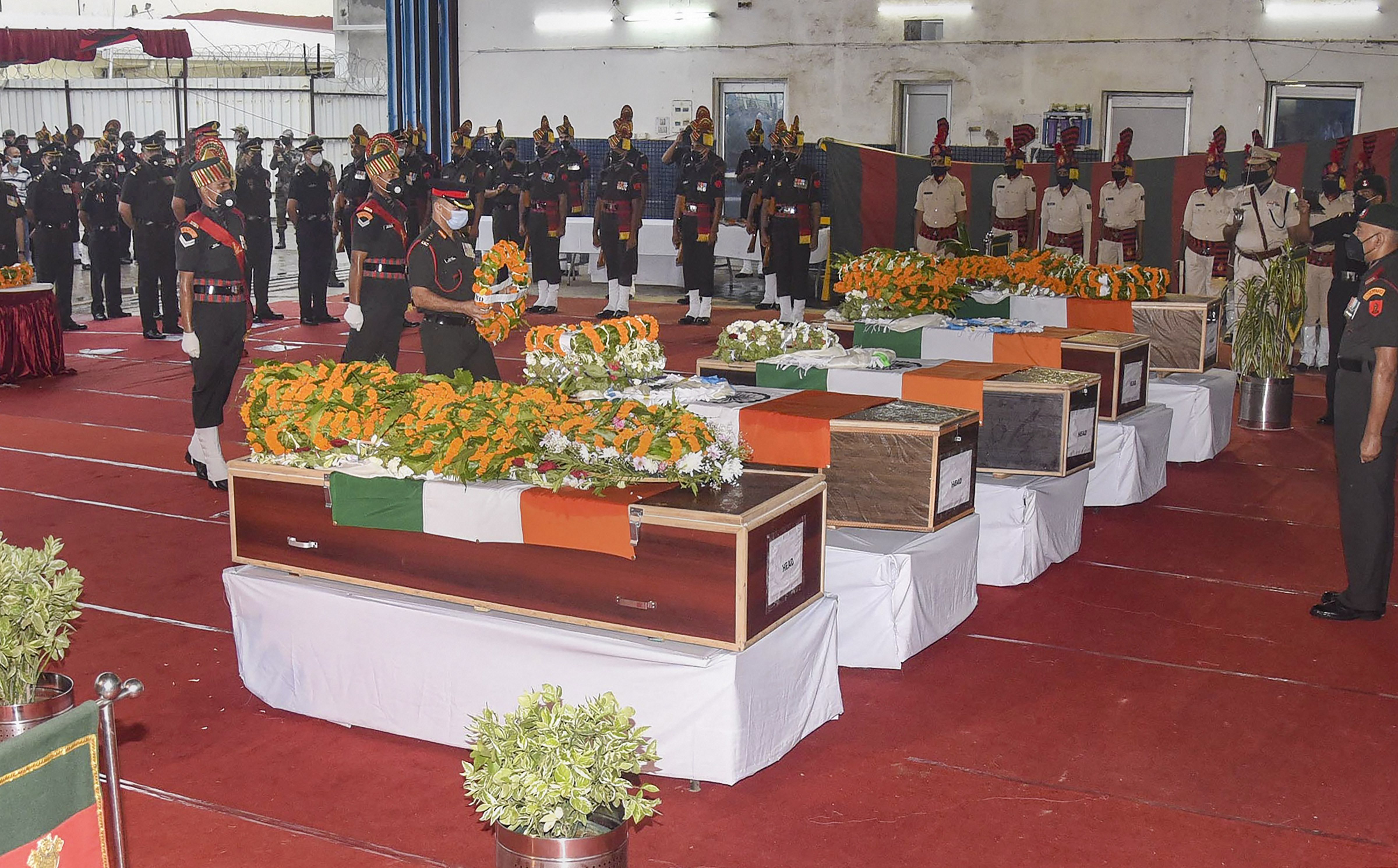The Narendra Modi government’s responses to the deaths of 40 CRPF troopers in last year’s Pulwama terror attack and the killing of 20 soldiers by the Chinese army on Monday night present a contrast.
A day after the Pulwama massacre --- and two months before a general election --- the bodies of the CRPF jawans were brought to Delhi on an air force plane. The political leadership paid homage to the dead in a televised programme amid an escalation in anti-Pakistan rhetoric.
No such gesture has yet been forthcoming for the slain soldiers, who died in a violent faceoff in the Galwan Valley of eastern Ladakh, despite the government’s avowed commitment to a muscular form of nationalism.
While the coronavirus-induced compulsions against gatherings would anyway have limited any post-Pulwama-like show, the government’s muted response to the Ladakh carnage --- in contrast to the muscle-flexing that followed the CRPF deaths --- has prompted questions from army veterans.
It took defence minister Rajnath Singh 36 hours to break his silence on Monday night’s killings.
His comment describing the deaths as “deeply disturbing and painful” was the first statement from the political leadership on the subject --- and it came on Twitter.
“When the Pulwama attack took place, there was an election to be won. Now there’s no election, so the government has chosen not to bring the bodies to Delhi and make a spectacle of it. It clearly shows the government’s double standard,” a retired general told The Telegraph, requesting anonymity.
“The BJP benefited tremendously from the Pulwama attack by using it as an electoral issue. It also claimed credit for the subsequent military operations, like the cross-border air strikes on Balakot in Pakistan.”
Prime Minister Modi had been the first to pay homage to the slain CRPF troopers when their bodies arrived at the Palam airbase on a C-130J Super Hercules aircraft on February 15, 2019.
Television images showed Modi, hands folded and head bowed, walk around 40 Tricolour-draped coffins as he led the nation in paying its last respects to the dead.
Later, homage was paid by national security adviser Ajit Doval, then Congress president Rahul Gandhi, Delhi chief minister Arvind Kejriwal, the then chiefs of the three services and senior cabinet ministers, including then defence minister Nirmala Sitharaman and then home minister Rajnath.
Each of them laid a wreath on a coffin in a solemn ceremony. The bodies were later sent to their respective states.
This time Modi, who had for over a month said nothing despite reports of Chinese incursions in eastern Ladakh, also stayed mum on the killing of the 20 soldiers till Wednesday afternoon.
He broke his silence at a prescheduled meeting with chief ministers that was meant to discuss the Covid-19 crisis.
India is “capable of giving a yathochit (befitting) reply”, Modi said in his opening remarks at the videoconference, although the written text put out by the government replaced “yathochit” with “nirnayak (decisive)”.
Modi also asked the chief ministers to observe two minutes’ silence in the slain soldiers’ honour.
In contrast, government leaders had been so loquacious about Pulwama in the run-up to last summer’s elections that over 150 veterans had written to the President expressing anguish at poll campaigners politicising the army.
They had questioned ruling establishment members’ move of claiming “credit for military operations like cross-border strikes, and even going so far as to claim the armed forces to be ‘Modi ji ki sena’ (Modi’ army)”.
Modi had asked first-time voters to dedicate their ballots to the soldiers who carried out the Balakot air strikes. Uttar Pradesh chief minister Yogi Adityanath had referred to the armed forces as “Modi ji ki sena”.
The government’s responses to the Pulwama and Galwan Valley killings do, however, show one similarity: its reluctance to lift the veil of mystery on how they happened.
While the Centre insisted on Tuesday that all India’s activities take place on its side of the border, it is yet to reveal how the Chinese could have entered Indian territory and killed its soldiers.
“Our soldiers were killed in our own territory. How could the Chinese army transgress into an area that has been ours since 1962?” the retired general who spoke to this newspaper said.
He asked why the government had not yet fixed accountability for the command failure and intelligence lapse that resulted in the Chinese incursions since early May.
Sixteen months after Pulwama, too, the government has not yet explained how a single terrorist could cause such havoc in one of the world’s most militarised zones.
Nor has accountability been fixed for the intelligence failure that allowed a car bomber to drive into the path of a CRPF convoy on a heavily secured highway, and apparently from the wrong direction.











